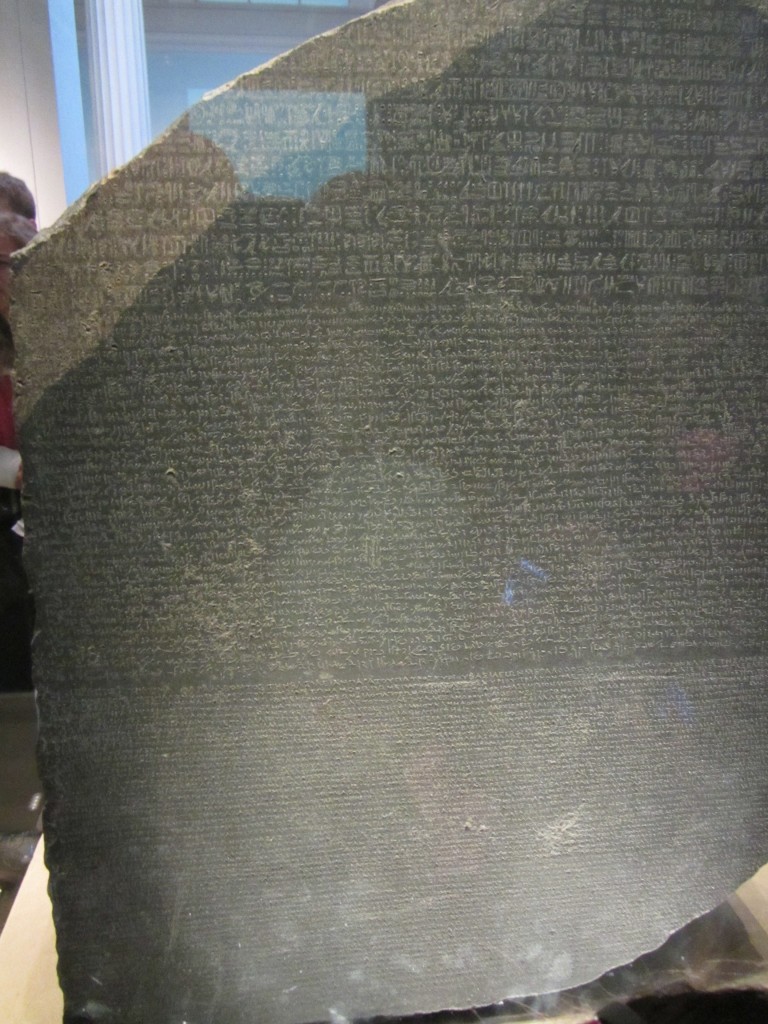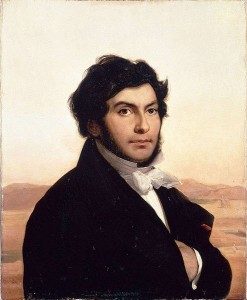A Story: Once upon a time, there was a young boy called Jean-François, who was very quiet and studious. Oddly enough, although he loved books, he was not content with reading his own language. He wanted to read languages that he could not understand.
In fact, the languages that almost no one could understand interested him more than anything else. The only people who knew these languages were scholars in universities who had spent their lives in the study of ancient texts and musty scrolls. Jean-François learned Persian and Sanskrit, along with many other ancient tongues. He also began work on a dictionary and grammar of the Coptic language and used this language to write his journal. At the time, he had no idea that this language would allow him to unlock an ancient mystery, a written script that people hadn’t been able to read for a long time. Actually, for more than 1500 years.

With the help of this stone and the ancient tongues he had learned as a child, Jean-Francois Champollion unlocked a 1500-year-old mystery. It is because of him that we know so much about the ancient Egyptians.
Dear 7B,
If you think about it, the power of the written word is immense. With your ability to write, you can go on Facebook (I hope not too often) or email a friend a recipe. You can write a love poem, a story, a great work of literature, just laws, beautiful lyrics for a song or even a blog like this.
Human talents such as writing can help us to soar above the tiresome details of everyday life, but they can also be employed for destructive purposes. For instance, you could write lies and slander and so use the written word to destroy reputations. If you were a dictator or a tyrant, you could issue orders that might destroy the lives of the people you were oppressing. You could use writing to enslave others. You could even write a death sentence.
All the same, can you imagine how many aspects of human life would be different, how impoverished life would be, without this simple, supreme gift of human expression?
You see, once you can write down a language, you can preserve ideas beyond your own lifetime and send them across the world. You can give orders, create books of quotations, remember speeches and create literature. Your ideas can travel through time and space. They are no longer dependent upon your physical presence. Writing makes us all time travellers.
 The ancient Egyptians used writing to administer their complex hierarchical society, to give orders, to tot up taxes, to write the spells that would protect the dead in the afterlife and to describe their lives. Their tombs were covered with the beautiful, pictorial symbols we call hieroglyphics.
The ancient Egyptians used writing to administer their complex hierarchical society, to give orders, to tot up taxes, to write the spells that would protect the dead in the afterlife and to describe their lives. Their tombs were covered with the beautiful, pictorial symbols we call hieroglyphics.

The knowledge of how to read ancient Egyptian hieroglyphics, however, was lost for more than 1500 years, until Jean-François Champollion figured out how to decipher these beautiful and mysterious symbols. As a boy he used to write his journal in Coptic, the language used by the early Christian Church in Egypt, but long since dead.
A language is considered dead when no living child speaks it as his mother tongue. No living child had spoken Coptic for over 1500 years, but it turned out to be the one written language that could provide clues to the sounds of ancient Egyptian speech.
 Never suspecting that Coptic might supply the vital link to understanding hieroglyphics, Champollion learned it as a teenager, along with several other dead languages. It was knowledge that he placed on the back-burner of his mind. One day that knowledge would burst into flame. One day it would illuminate the study of ancient Egypt.
Never suspecting that Coptic might supply the vital link to understanding hieroglyphics, Champollion learned it as a teenager, along with several other dead languages. It was knowledge that he placed on the back-burner of his mind. One day that knowledge would burst into flame. One day it would illuminate the study of ancient Egypt.
♥To discover the basic details of hieroglyphics, go to this link:
http://www.woodlands-junior.kent.sch.uk/Homework/egypt/writing.htm
♥This link could also be helpful:
http://www.historyforkids.org/learn/egypt/literature/hieroglyphs.htm
♥To learn how to write your name in hieroglyphics, visit this website:
http://www.guardians.net/egypt/hieroglyphs/hiero-translator.htm
In order to read the fascinating story behind the decipherment of ancient Egyptian hieroglyphics, go to this link:
http://www.bbc.co.uk/history/ancient/egyptians/decipherment_01.shtml
As you read, look for or think up answers to these questions (and write or type brief notes):

♦Write your name in hieroglyphics and write 3 dot points about this ancient script.
♦What is a cartouche? How did this symbol help in the decipherment of hieroglyphics?
♦Champollion wrote that “phonic” symbols were the basis of hieroglyphics. What does this mean?
♦Why is writing important for you personally?
******************************************************************************
 There is of course a moral to this story. (There’s a moral to all my stories.) You may think something you’re learning now is just for fun, or perhaps that you are learning it just because your teacher wants to be a slave-driver. Well, that last bit might be true! But put this new knowledge on the backburner and let it gently simmer. One day in a decade or two it might help you to find a job, learn a new and wonderful skill, make another person happy, or change the world.
There is of course a moral to this story. (There’s a moral to all my stories.) You may think something you’re learning now is just for fun, or perhaps that you are learning it just because your teacher wants to be a slave-driver. Well, that last bit might be true! But put this new knowledge on the backburner and let it gently simmer. One day in a decade or two it might help you to find a job, learn a new and wonderful skill, make another person happy, or change the world.
I like the story of Euclid, who was teaching a young man geometry. Euclid was an ancient Greek whose mathematical textbooks were used until the 19th century and whose work is still the basis of related study today. Euclid’s student, after learning the first theorem, unwisely asked, “What shall I get by learning these things?” Euclid called his slave and said: “Give this young man a few coins, since he must get something from what he learns”. Perhaps this is what Euclid meant: when you learn something, you shouldn’t worry what it gives you. Leave that to the “grand Perhaps”, as Browning called it.
